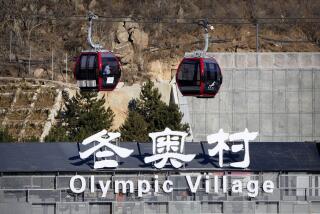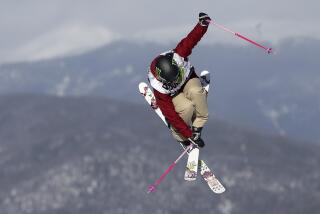The 2014 Games in Sochi, Russia, could be more challenging for U.S.
- Share via
Reporting from Vancouver, Canada — Worldsnowboarding.com offered a comprehensive look at the quaint mountain resort of Krasnaya Polyana, Russia, with one seemingly minor disclaimer.
The website said the resort’s only disadvantage was its size and mild climate, “which means there is a risk to find too little snow at the lower runs even in January.”
Wait a minute. . . .
Didn’t we just go through this for the last two weeks, let alone the furious lead-up effort to redistribute snow to weather-challenged Cypress Mountain?
Now, we might go through it all again at the Sochi 2014 Olympics?
You might say Sochi, Russia, and Vancouver, Canada, have plenty in common.
Vancouver is referred to by the rest of Canada as “Lotus Land,” and Sochi bears the nickname “the Russian Riviera,” a Black Sea resort for the rich and famous.
Then there’s the hometown hockey pressure. If you think the pressure on the gold medal-winning Canadian hockey team was intense, think “suffocating” in Russia.
One newspaper headline called Russia’s 7-3 quarterfinal loss to Canada “Nightmare in Vancouver.”
Unlike Sochi, Vancouver could boast of the advance readiness of its facilities. When attention turned to Vancouver at the end of the 2008 Beijing Summer Olympics, all but two venues had been completed.
Construction is underway in Sochi but organizers don’t expect to hold the first test event, in Alpine skiing, until a year from now. There are two clusters of competition, a coastal grouping for the Central Stadium and ice hockey and figure skating venues, and the mountain sports venue at Krasnaya Polyana, which will stage skiing, snowboarding and luge, among other events.
Sochi 2014 Chief Executive Dmitry Chernyshenko said Saturday that his organization brought a group of 150 to observe the Vancouver Games and paid close attention to the Cypress Mountain issues.
“The major milestone is deliver everything [in] two years, two competition seasons prior to the Games,” he said. “Well in advance. So we’re looking at plenty of time to own our venues and train our personnel.”
One benefit to U.S. athletes was that venues in Vancouver were available years in advance, and were not too far away. Nordic combined gold medalist skier Bill Demong had been coming to Canada to train as far back as three years ago.
“It has felt like a home Games to us, and that is part of the reason we are doing so well,” he said. “It’s going to be a little bit different [for 2014]. You can’t just get a couple-hour flight and go to Sochi.”
Mike Plant, chef de mission for the U.S. team, said the U.S. Olympic Committee will send scouting teams to Sochi this year.
“They start looking at venues and the geography and the area and start to understand it years in advance,” he said, “so when we do get to the Games, we’re probably the best-prepared team not just competitively because of the [athletes], but also because of our operation. Combine that with the commitment and passion and dedication of these athletes, you come out with a pretty powerful combination.”
lisa dillman@latimes.com
twitter.com/reallisa
Philip Hersh of the Chicago Tribune contributed to this report.
More to Read
Go beyond the scoreboard
Get the latest on L.A.'s teams in the daily Sports Report newsletter.
You may occasionally receive promotional content from the Los Angeles Times.







